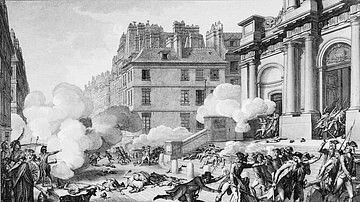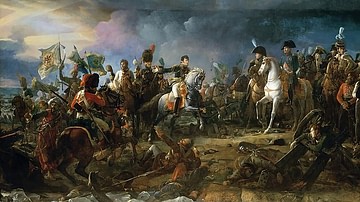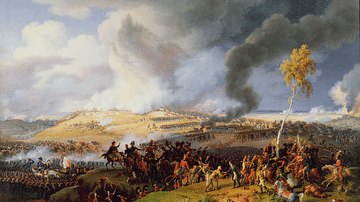Napoleon Bonaparte (1769-1821), Emperor of the French, was one of the most successful military commanders of the modern era. From relatively humble beginnings, he rose to prominence during the tumultuous wars of the French Revolution, ultimately fighting in over 60 battles, of which he lost only seven. His conquests expanded his empire to the borders of Europe.
Born to a family of minor Corsican nobility a year after Corsica was acquired by France, Napoleon recieved an education in French military academies and joined the army as an artillery officer. He supported the French Revolution when it began in 1789, and helped the revolutionary government reclaim the port city of Toulon after it had been captured by counter-revolutionary rebels and Coalition troops; his actions at the Siege of Toulon in 1793 earned him the rank of brigadier general, aged only 24, and began his illustrious career. He would go on to suppress a royalist rebellion in Paris in 1795 before leading the French on campaigns in Italy and Egypt. His popularity would grow to such heights to allow him, in 1799, to seize control of France in the Coup of 18 Brumaire.
Thus ended the revolutionary period, ushering in a new era: the Napoleonic. In the decade after the Coronation of Napoleon I as Emperor of the French in 1804, Napoleon would lead his Grande Armée on several brilliant campaigns against his European enemies, which often included Great Britain, Austria, Prussia, or Russia at the head of a European coalition (there were ultimately seven). At the height of the First French Empire in 1810, Napoleon's influence stretched from the Iberian Peninsula to Poland. Yet a series of setbacks in Spain and Russia would see Napoleon's empire unravel by 1812. He was forced to abdicate in 1814 only to make a triumphant return to France the following year; defeated by the Duke of Wellington at Waterloo in 1815, he was finally exiled to St. Helena, the lonely South Atlantic island where he would die in 1821.
This collection contains each of the campaigns in which Napoleon fought during his 22-year-long military career, as well as several handpicked battles in which he commanded. Through these 17 key campaigns and battles, one can trace the meteoric rise and resounding fall of one of history's most well-known and controversial leaders.


















